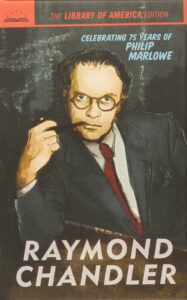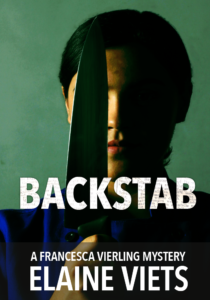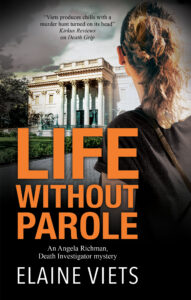 By Elaine Viets
By Elaine Viets
Most mystery writers know this quote by Raymond Chandler: “When in doubt, have a man come through the door with a gun in his hand.”
Like most mystery writing advice, this “man with a gun” needs more explanation.
According to author Louise Tondeur, Chandler was talking about “the demand … for constant action” and how “this could get to be pretty silly.”
“In other words, he was NOT issuing a tip for budding crime writers. He’s saying something closer to: there’s a demand for constant action in detective fiction, men are always rushing in with guns, there’s no time to look around, that’s sort of a shame, but that’s what you’ve got to do to get published these days (these days being 1950).”

So let’s look at that man with a gun metaphorically, as a constant need for action. Chandler’s quote is really about pacing and surprises in your writing.
You can’t have guys with guns running around loose in your novel and surprises popping up like Whac-A-Mole. Here are some points to consider:

Why not a woman with a gun?
Even Chandler had his femme fatales. For this discussion, the man with the gun could also be a woman. Your surprises are not bound by gender.
Is the man with the gun threatening or killing someone?
That threat can lead to several spicy chapters: your protagonist may manage to persuade the man with the gun not to kill him, or somehow overpower him. The man with the gun could become an ally or remain a deadly enemy. Either way, you’ve gained some plot points.

What if the man with the gun kills someone?
That’s good, right? I mean, it’s good for your story, not your victim. It moves the plot along.
Maybe. But this man could create more problems. Consider this.
Who is he killing and why?
Is he shooting a witness? Will that complicate the plot? Is he killing someone he’s always hated? Or a lover who betrayed him? Think about it. This can’t be a random murder. Ask yourself, do I need this surprise/killing here? Or should I use another way to pick up the pace?
 Murder thoughtfully and with restraint.
Murder thoughtfully and with restraint.
When I first started writing mysteries, I killed like a serial killer on a spree. Unfortunately, I killed one of my better characters, Lee the Rehabber, in my first mystery, Backstab. As the series went on, I realized I could have used the chatty home renovation expert in other books, but it was too late. I couldn’t even claim he had amnesia and returned from a long trip. I’d already autopsied him. Consider your character’s future usefulness before the bullets start flying.
If you’re writing a cozy, for heaven’s sake, don’t let him shoot anyone.
Not in front of your readers, anyway. They don’t want to see all that blood.
Cozies are a delicate balance of family, friendship and murder. You can’t let the corpses start piling up.
Murder according to your genre. You may want more murders in an action-packed thriller or noir mystery.
Finally, if you’re going to have a second (or third, or fourth) murder in your mystery, tie the murder into the plot.
The killing could be a red herring or a clue, a friend of your protagonist or an enemy, but the murder should be tied to the story in some way. I got this advice from one of my editors, and it’s served me well. She did not like random murders showing up in my books.
Just remember: You are the god of this world you’ve created, and in your world, all murders (and surprises) must happen for a reason
This Friday, Nov. 12, I’m appearing in-person 7:00 PM, at Murder on the Beach Mystery Bookstore to sign my new Angela Richman mystery, LIFE WITHOUT PAROLE.
Murder on the Beach is at 104 West Atlantic Ave., Delray Beach, FL 33444. This will be a free and safe event, with masks and social distancing. You can Zoom, too. Email Murder on the Beach for your free Zoom link. StaceyMOB@gate.net.

That’s one of my favorite Chandler quotes, Elaine. Thanks for the reminder and for the terrific advice. May I make so bold as to add two more points:
1) Consider having the man come through the door with a knife in his hand.
2) Whatever you do, don’t let him kill the cat. I mean, just don’t.
Have a great weekend, Elaine!
So true, Joe. Killing any animal in a mystery, especially a cozy, will get you in big trouble. However, you can slaughter as many people as you want.
As well as kids. Never kill a kid. Dogs are even more problematic because John Wick will break the fourth wall to go after the dog killer.
That’s the other rule, Marilyn. Kids cannot be killed, especially in cozies.
“I’d already autopsied him.” This line cracked me up, Elaine. Definitely can’t recycle this poor character.
Hope you have a wonderful evening at Murder at the Beach. Congrats on Life Without Parole!
Haha. That line cracked me up, too.
Glad you liked it, Sue.
Perhaps the autopsy was a case of mistaken identity, an unknown twin? Your chatty home renovation expert probably went into hiding when he realized someone was out to kill him.
Wish I’d been smart enough to think of that, Lars.
Thanks, Debbie. With poor dead Lee, I learned the hard way.
Dang. There’s no UNDO button for an autopsy.
You are so right. Sometimes I’d like to hit the UNDO button for entire days.
I like this post, Elaine. When I started writing, I wondered why, when there are so many other crimes people commit, mystery readers wanted murders. Upping the tension by throwing in people with guns and dead bodies isn’t what I write, although I’ve bowed to the convention. For me, mysteries are puzzles, and it’s the solution I like to follow.
You got it, Terry.
Yeah, it’s the puzzle that I love. I love puzzles so much, I’ve invented 3 of them, 2 patented.
Very cool.
Great! Thanks!
The way things are going these days, you might consider a kid with a gun. Or a movie star with a gun. Toy, plastic, a James Bond Beretta, an AR15 or whatever it’s called.
Absolutely, Ruth.
Great advice, Elaine. I learned this the hard way, too.
Hope your event is a smashing success!
Great post, Elaine. I had never read that explanation by Tondeur about the Chandler quote. Very interesting.
“Just remember: You are the god of this world you’ve created, and in your world, all murders (and surprises) must happen for a reason.” Reminds me of Ecclesiastes 3:1: To every thing there is a season, and a time to every purpose under the heaven…3:3: A time to kill, and a time to heal
So, with that constant need for action, conflict, tension, and surprises, maybe (as Joe alluded to with the man and the knife) we need to constantly look for unique and original ways to add subplots or prop up the sagging middle.
I hope that Friday night, the bookstore is packed and they sell their entire inventory of LIFE WITHOUT PAROLE.
Good thoughts as usual, Steve. As for my Friday night event, from your lips to the real God’s ears.
The bookstore email link does not work?
The bookstore owner took off a few days, Carole, and you got her away message. Try this link instead: StaceyMOB@gate.net. Hope to see you there.
I used this advice years ago while writing a fantasy novel during Nanowrimo, I sent in an assassin with a crossbow, mainly because the plot was flagging. It did get things moving, but ultimately, didn’t help with the underlying issues with the story, and I trunked the novel.
Excellent advice, Elaine. I agree that this advice is really about looking at the pacing and surprises in your book, really about creating a twist or unexpected plot turn. And yes, since I’m writing a cozy series, I have to be careful not to let the bodies pile up–two deaths is a good number (except for the deceased of course) with the hero sleuth often running the risk of becoming the final death.
Have a great time Friday night at your LIFE WITHOUT PAROLE book signing event. Hope the store sells out their inventory.
Thanks, Dale. Maybe some day you’ll dig up that old novel, eliminate the assassin, and go forward. If not, you obviously learned from the experience.
Thanks for the advice, Elaine. I love that quote from Raymond Chandler.
I also love what you said about a murder has to be tied to the plot. I’ve read a couple of books where the author seemed to be using murder as filler.
Like Terry, I write cozies. A murder takes place offstage, before the story begins, and the rest of the book challenges readers to figure out whodunit. My books depend on clues, plot twists, and interesting characters to supply the tension.
Good luck with your book signing!
My editor’s pet peeve was random murders, Kay, and she made me rewrite at least one book.
I wrote romantic suspense. My version of this truism is “A man with another motive arrives.” A goon with a gun just isn’t suspensey enough except in the short term. Not that I didn’t have a goon or a bunch of goons show up to prove the hero and heroine were worthy of their titles and each other. Also, they make the man with another motive look even more suspicious.
Plot point example. The hero and heroine on the run from goons and unknown bad guy meet his former FBI partner at a restaurant. The ex-partner offers them information and a chance for the heroine to go into witness protection, then he leaves because they want to consider the offer. Goons with guns ambush them in the parking lot. How did the goons know where they were? It has to be the ex-partner because he’s the only one who knows where they were. But he’s the hero’s best friend. So, they set up the best friend to prove one way or the other whether he’s guilty. Even more suspensey things happen.
A few more truisms. For mystery, “If the pace is slowing down and the characters are running out of clues, kill someone else.” Not a great fan of this one because it’s an excuse for lazy plotting.
For romance, “Never kill a perfectly good hunk because he can be the hero in your next novel if the fans love him.” Or in your case with Lee the Rehabber, “Never kill a perfectly good secondary character.”
Love these, Marilyn. Words to live by — or kill by in my case.
“A man with another motive arrives.”
“Never kill a perfectly good hunk because he can be the hero in your next novel if the fans love him.”
Great post, Elaine. And I second all the best wishes for your event.
As most of you know, I don’t really write “man-with-a-gun” crime thrillers, but the point is to up the tension in my genre. I do like tension-filled reading, and as a new fiction writer, I want as much embedded as contributes to the plot. My characters are usually afraid of something, which the reader (I hope) will connect with. There’s so much to be afraid of these days. Dang, do I sound old?
Speaking of tension: my husband I recently watched a movie called 7500. The entire movie, except for about a minute in the beginning and again at the end, took place in the cockpit of a commercial passenger plane.
The. Entire. Movie. In the space of a standard-sized bathroom. You’d think boring!
Nope. It was a nail-biter from start to finish. For me, it was a good lesson in how to create tension in any scene that stretches right to the point of breaking.
Happy Veterans Day…if you served, or someone in your family served…Thank you!
Now I have to look up this nail-biter, Deb, and see how it’s done. Thanks.
I’ve always interpreted this as advice to interrupt the scene the moment it gets too dull or predictable with something that can’t be ignored. Something that will surprise the writer and hence the reader.
Obviously, there’s a Chekhov’s goon effect here, so if the interruption isn’t meaningful, it should be funny. My experience is that such interruptions take the whole story in twisty new directions, since making sense of them opens new doors and creates new complications.
And it doesn’t have to be a goon. “Oh, my god! My parents are home early!” can be even better.
Chekhov’s Goon: If a hooligan appears in Act 1, he must beat up somebody in Act II or III.
Thanks for the explanation, Jim.
“Oh, my god! My parents are home early!”
Terrific line.
A big thank you to all our veterans, including my husband, Don.
I agree with you on considering a character’s future usefulness but not just with the possibility of whether or not to kill them off–one of the interesting things about writing and getting feedback is that a character that you as the writer hadn’t put as much stock in can end up being very interesting to those giving feedback so you then do often end up using them more than you had perhaps planned.
Maybe there can be an alternate universe Lee the Rehabber. 😎